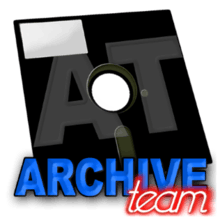Archive Team
Archive Team is a group dedicated to digital preservation and web archiving that was co-founded by Jason Scott in 2009.[1][2]

Its primary focus is the copying and preservation of content housed by at-risk online services. Some of its projects include the partial preservation of GeoCities,[3][4] Yahoo! Video, Google Video, Splinder, Friendster, FortuneCity,[5][6][7][8][9][10][11][12] TwitPic,[13] SoundCloud,[14] and the "Aaron Swartz Memorial JSTOR Liberator".[15] Archive Team also archives URL shortener services[16] and wikis[17] on a regular basis.
According to Jason Scott, "Archive Team was started out of anger and a feeling of powerlessness, this feeling that we were letting companies decide for us what was going to survive and what was going to die."[18] Scott continues, "it's not our job to figure out what's valuable, to figure out what's meaningful. We work by three virtues: rage, paranoia and kleptomania."[19]
Warrior/Tracker system
Archive Team is composed of a loose community of independent contributors/users. According to their institutional wiki, their archival process makes use of a Warrior, a virtual machine environment that individual users upload downloaded sites to.[20] The user will run a virtual machine on their individual machine (regardless of Operating System), download a site, and the warrior virtual machine will then incorporate the archived site to the Archive Team repository hosted by The Internet Archive. The warrior works in conjunction with software called the Tracker[21]. This software tracks progress and projects via a user/project leader board. The tracker also is responsible for delegation of projects to the warrior and the users.
Projects
Google Plus has been the biggest project of ArchiveTeam as of May 2019 with a size of over 1.56 Petabytes.[22]
See also
References
- Scott, Jason (January 6, 2009). "Team Archive is GO". ASCII by Jason Scott. Archived from the original on 2016-11-02. Retrieved December 30, 2016.
- "Revision history of "Main Page"". Archive Team. Archived from the original on 2016-12-31. Retrieved December 30, 2016.
- Gilbertson, Scott (2010-11-01). "Geocities Lives On as Massive Torrent Download". Wired. Archived from the original on 2012-04-20.
- Modine, Austin (2009-04-28). "Web 0.2 archivists save Geocities from deletion". The Register. Archived from the original on 2012-04-20.
- Sullivan, Mark (2012-04-13). "The 'Archive Team' Rescues User Content From Doomed Sites". PC World. Archived from the original on 2012-04-20.
- Schwartz, Matt (January 2012). "Fire in the Library". Technology Review. Archived from the original on 2012-04-20.
- Garfield, Bob; Scott, Jason (2012-03-23). "The Archive Team". OnTheMedia. Archived from the original on 2012-04-20. Retrieved 2012-04-19.
- Masnick, Mike (2012-04-12). "Historic Archive Of Websites From The January 18th SOPA Blackout". Techdirt. Archived from the original on 2012-04-20.
- Scott, Jason (2012-03-06). "Click: The Archive Team - Jason Scott talks about his mission to salvage our digital heritage". BBC. Archived from the original on 2012-04-20.
- Morton, Simon; Scott, Jason (2012-03-03). "The Archive Team". RadioNZ. Archived from the original on 2012-04-20.
- Misener, Dan (2011-04-29). "Full Interview: Jason Scott on online video and digital heritage". CBC. Archived from the original on 2012-04-20.
- Paul-Choudhury, Sumit (May 6, 2011). "Amateur heroes of online heritage". New Scientist. Archived from the original on March 9, 2015. Retrieved March 9, 2015.
- "TwitPic - Archiveteam". Archived from the original on 2014-09-09. Retrieved 2014-09-17.
- "Archive Team promises to back up SoundCloud amid worries of a shutdown". 2017-07-18. Archived from the original on 2018-10-21. Retrieved 2018-11-28.
- "Aaron Swartz Memorial JSTOR Liberator sets public domain academic articles free". 2013-01-15. Archived from the original on 2018-03-23. Retrieved 2018-11-28.
- "url shortening was a fucking awful idea". URLTE.AM. Archived from the original on 2011-06-11.
- WikiTeam Archived 2016-02-10 at the Wayback Machine - We archive wikis, from Wikipedia to tiniest wikis
- "Open Source Bridge 2012 Keynote - Jason Scott". Archived from the original on 2017-09-14. Retrieved 2018-11-28.
- "Open Source Bridge 2012 Keynote - Jason Scott". Archived from the original on 2017-09-14. Retrieved 2018-11-28.
- "ArchiveTeam Warrior - Archiveteam".
- "Tracker - Archiveteam".
- Google Plus on ArchiveTeam Wiki.
External links
- Official website
- Archive Team collection at Internet Archive
- Archive Team on Twitter

- ARCHIVE TEAM: A Distributed Preservation of Service Attack on YouTube
- ArchiveTeam subreddit